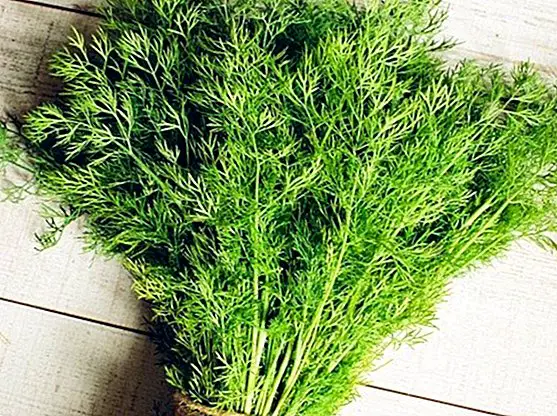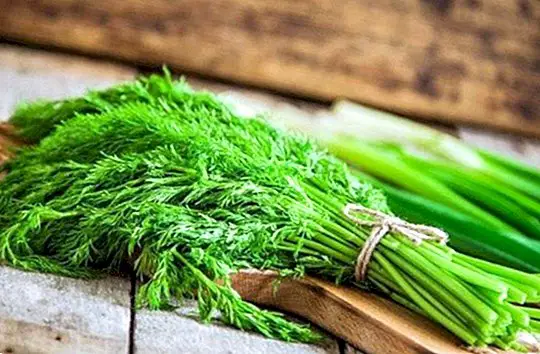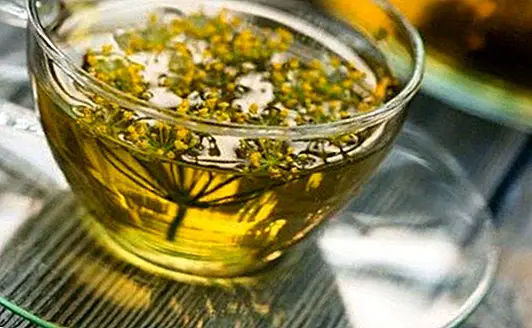Dill: benefits, medicinal properties, contraindications and remedies
The dill It is an aromatic plant known since ancient times that take us to the times of the Greeks, Egyptians and Romans and its origin is from the eastern region of the Mediterranean Sea and Asia Minor.
The scientific name of the Eneldo is "Anethum Graveolens"And belongs to the family of the" Umbelliferae ", Umbelliferae. Currently dill is grown in many countries and also grows wild. 
It is an annual plant, which can grow up to one meter in height, and blooms in summer. At the time of collecting the seeds, we must do it when they are ripe, we can appreciate it in its color that should be brown.
Dill is an aromatic plant, with an aniseed smell and slight lemon odor, and in addition to its use for its medicinal properties, Eneldo is also used in the kitchen to flavor fish recipes, seafood, to marinate salmon, in salads, sauces.
When using Eneldo it is best to do it in its fresh version to better appreciate both its flavor and its aroma. If we can not get it fresh, in the market we will also find it as dry grass.
Most important dill benefits
The parts that are used of this plant are the leaves, fruits and seeds. On the other hand, from a nutritional point of view it is rich in fiber, carbohydrates, vitamins (A, C, vitamins of group B, B1, B2, B3, B5, B6, B12), minerals (calcium, magnesium, iron , sodium, phosphorus, potassium, zinc, copper, selenium, manganese) and fatty acids.
On the other hand, we can mention that the dill is antispasmodic, carminative, diuretic, aromatic, galactagogo, antiseptic and antiemetic. In addition, among its active ingredients we find essential oil, lemon and carvonene.
In regard to its medicinal benefits, dill is ideal to combat flatulence, relieve colic associated with gas, promote digestion, increase the secretion of breast milk in case of nursing mothers, soothe the pain associated with the menstruation, eliminate fluid retention and combat halitosis. 
The Eneldo we can get it in the market, supermarkets, also in herbalists, natural products stores, online. And we can get it in the form of fresh and dried plant, seeds, essential oil and liquid extract.
How to prepare natural remedies with Dill
Infusion of dill to relieve gas colics
This infusion is effective both to relieve gas cramps once they appear or to avoid them if we take it before eating.
Ingredients:
- 2 teaspoons of Dill seeds.
- A cup of mineral water.
preparation:
Crush the seeds of Dill lightly. In a saucepan we put the water to heat. Once it starts to boil, add the seeds of Dill.
We extinguish the fire, cover the infusion and let it rest for 10 or 15 minutes. We strain the infusion and take it warm.
From this infusion we can take a cup before meals to prevent the appearance of gas or a cup after meals if we have flatulence or colic.
Infusion of dill seeds to promote digestion
To prepare this infusion we will need the seeds of the Dill.
Ingredients:
- A cup of mineral water.
- Two teaspoons of dill seeds
preparation:
We will crush the seeds of Eneldo. We put the water in a saucepan to boil. When it starts to boil, add the seeds. We remove from the fire.
Cover the infusion and let it rest for 10 minutes. We uncover the infusion, we strain it and when it is warm we can take it.
If you prefer the infusion with sweet touch, we will sweeten as we like. From this infusion we can have a cup after meals. 
Dill seeds to combat halitosis
One of the benefits of the Eneldo is that it suits us well in case of suffering from halitosis, to prepare this home remedy we need to resort to the seeds of Dill.
Once we have the seeds of Eneldo we take a few and chew them. This remedy is also effective when we have eaten a very spicy meal and we do not want to see bad breath.
Contraindications of the Dill
The Eneldo does not present contraindications since it is not a toxic plant, and as we mentioned at the beginning of this post is a medicinal plant that is not only used to prepare home remedies also as a healthy ingredient in the kitchen.
The cases in which its use is not advised are the following:
- In case of being pregnant.
- In case of suffering gastritis.
- In children.
Although one of the benefits attributed to the Eneldo is to increase the secretion of breast milk, nursing mothers who are breastfeeding should consult with the doctor before consuming this medicinal plant. This article is published for informational purposes only. You can not and should not replace the consultation with a Nutritionist.We advise you to consult your trusted Nutritionist. ThemesFoods Aromatic herbs


